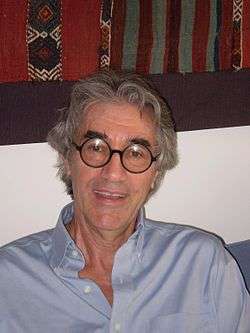Gino Claudio Segre
| Gino Claudio Segre | |
|---|---|
 | |
| Born |
Gino Claudio Segrè October 4, 1938 Florence, Italy |
| Nationality | Italian, American |
Gino Claudio Segrè (born October 4, 1938) is a Professor of Physics, Emeritus, at the University of Pennsylvania. He is the author of several books on the history of science, particularly on atomic physics. Segrè’s Faust in Copenhagen was a finalist in the Los Angeles Times Book Fair[1] and winner of the American Institute of Physics Science Writing Award.[2]
Birth and education
Gino Segrè was born in Florence, Italy, to an Italian Jewish father (Angelo Segrè) and a German Catholic mother (Katherine ‘Katia’ Schall Segrè). The family immigrated to New York City in May 1939, where they resided for 8 years before returning to Florence.[3] Segre’s uncle, Nobel laureate physicist Emilio Segrè also emigrated to the United States in 1938 because of the anti-semitic laws enacted in Italy.
Gino Segrè received a Bachelor of Arts degree from Harvard College in 1959 and a Ph.D. degree in physics from Massachusetts Institute of Technology in 1963. Afterwards, Segre became a fellow at CERN and the University of California, Berkeley. He joined the University of Pennsylvania physics department as a professor in 1967, where he remained until he retired in 2007. His honors include fellowships from Guggenheim Foundation, Sloan Foundation and Rockefeller Foundation.
Books
Since 2002, Segrè has published three books on the history of science. Segrè's Ordinary Geniuses is a dual biography of Max Delbruck and George Gamow, two physicists who made major contributions to the field of biology with their 'pioneering' spirits and practical jokes.[4] Ordinary Geniuses was reviewed by Jeremy Bernstein in The Wall Street Journal[5] and Jonathon Keats in New Scientist.[6] Segrè's book Faust in Copenhagen recounts how a group of 40 physicists assembled at Niels Bohr’s Copenhagen Institute focusing on the discovery of the neutron.[7] On the final night of the meeting, the younger physicists mount a skit that was a parody of Goethe’s Faust, adapted to the world of physics. By Segre’s description, ‘What the physicists didn’t realize was that within a year, Hitler’s ascent to power would change their world and within a decade their studies of the atomic nucleus would force them to make their own Faustian bargains.’ Faust in Copenhagen was reviewed in the Sunday New York Times book section by George Johnson.[8]
Segrè's A Matter of Degrees: What Temperature Reveals about the Past and Future of our Species, Planet and Universe[9] explores temperature’s many mysteries, from the causes of fevers in humans to the origin of the universe. Marcia Bartusiak reviewed Matter of Degrees in The New York Times.[10]
The Pope of Physics: Enrico Fermi and the Birth of the Atomic Age will be published on October 18, 2016. Written with Bettina Hoerlin, The Pope of Physics explores the life and career of Enrico Fermi.[11]
Scientific research
Segrè’s research has ranged across several major scientific topics within high-energy theoretical physics, including electroweak interactions to develop better understand of symmetry violations.. Within astrophysics his research contributions have ranged from baryon asymmetry to pulsar kicks. His work includes:Pulsar Velocities and Neutrino Oscillations (with A. Kusenko, Phys. Rev. Letters, 1996);[12] Pulsar Kicks from Neutrino Oscillations (with A. Kusenko, Phys. Rev., 1999);[13] and Implications of Gauge Unification for the Variation of the Fine Structure Constant (with P. Langacker and Matt Strassler, Phys. Letters, 2002).[14]
Personal life
Segrè is married to Bettina Hoerlin, a former Philadelphia Health Commissioner. She is the daughter of Los Alamos physicist Hermann Hoerlin and Kate Tietz Schmid. Hoerlin has chronicled her parents meeting and departure from Nazi Germany in her book ‘Steps of Courage’.[15] Together they have seven children, nine grandchildren and live in Philadelphia.
External links
- Segrè’s website at University of Pennsylvania[16]
- Segrè’s author page[17]
- Segrè’s conversation with Claudia Dreifus at The New York Times - "In the Footsteps of His Uncle, Then His Father"[18]
- Scientific publications of Gino Claudio Segre on INSPIRE-HEP
References
- ↑ "2007 Los Angeles Times Book Prizes Winners". Los Angeles Times. 11 April 2007. Retrieved 2014-08-19.
- ↑ "American Institute of Physics Announces Awards for Best Science Writing" (Press release). American Institute of Physics. 24 February 2009. Retrieved 2014-08-19.
- ↑ "Old Friends". Penn Gazette. November–December 2011. Retrieved 2014-08-19.
- ↑ Segre, Gino (18 August 2011). Ordinary Geniuses: Max Delbruck, George Gamow and the Origins of Genomics and Big-Bang Cosmology. Viking-Penguin. ISBN 0670022764.
- ↑ Bernstein, Jeremy (13 August 2011). "Book Review: Ordinary Geniuses". Wall Street Journal. Retrieved 2014-08-19. (subscription required (help)).
- ↑ Keats, Jonathon (24 August 2011). "CultureLab: A pair of maverick physicists". Newscientist.com. Retrieved 2014-08-19.
- ↑ Segre, Gino (2007). Faust in Copenhagen: A Struggle for the Soul of Physics. Viking. ISBN 0143113739.
- ↑ Johnson, George. "Meta Physicists". The New York Times. Retrieved 2014-08-19.
- ↑ Segre, Gino (2002). A Matter of Degrees What Temperature Reveals about the Past and Future of our Species, Planet and Universe. Viking. ISBN 014200278X.
- ↑ Bartusiak, Marcia (4 August 2002). "Fahrenheit 451,000". Nytimes.com. Retrieved 2014-08-19.
- ↑ http://us.macmillan.com/thepopeofphysics
- ↑ "[hep-ph/9606428] Velocities of pulsars and neutrino oscillations". Arxiv.org. 2 November 1996. Retrieved 2014-08-19.
- ↑ "Phys. Rev. D 59, 061302(R) (1999) - Pulsar kicks from neutrino oscillations". Prd.aps.org. 25 February 1999. Retrieved 2014-08-19.
- ↑ "Implications of gauge unification for time variation of the fine structure constant". Physics Letters B. 528: 121–128. 28 February 2002. doi:10.1016/S0370-2693(02)01189-9. Retrieved 2014-08-19.
- ↑ "Steps of Courage: My Parents' Journey from Nazi Germany to America". Bettinahoerlin.com. Retrieved 2014-08-19.
- ↑ "Gino C. Segre | Physics & Astronomy". Physics.upenn.edu. Retrieved 2014-03-02.
- ↑ "About Me | Gino Segrè". Ginosegre.com. 2007-08-14. Retrieved 2014-03-02.
- ↑ "In the Footsteps of His Uncle, Then His Father". The New York Times. Retrieved 2014-03-02.